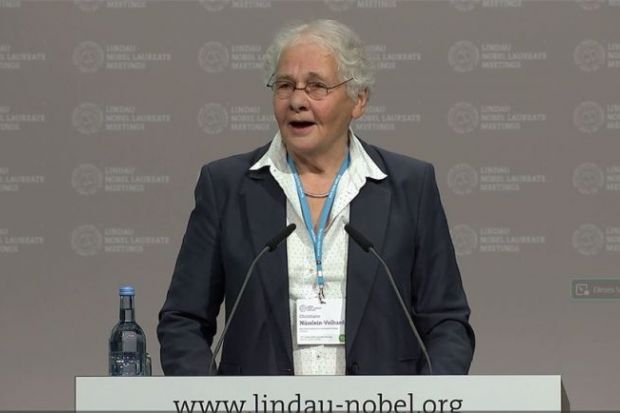Having diversity in scientific laboratories is not essential for achieving research excellence, Germany’s only female Nobel science laureate has argued.
“I don’t know whether diversity is absolutely necessary for scientific success,” Christiane Nüsslein-Volhard, who won the Nobel Prize in Physiology or Medicine in 1995, told the Lindau Nobel Laureate Meeting in southern Germany.
The structural biologist, who founded the Christiane Nüsslein-Volhard Foundation to support women with children in science in 2004, told a panel that, although diversity was “absolutely positive” and led to “enrichment” of the scientific environment, it was not a prerequisite for success.
“When I was growing up in Germany there were almost no foreign researchers and…we did not have many interactions with international scientists, but there were very devoted scientists who concentrated on their topics and were very curious and interested,” said the former secretary general of the Heidelberg-based European Molecular Biology Organization.
Campus resource: We need an integrated approach to inclusion in higher education
“Many scientists are very focused on their own research and do not care about their surroundings – there are many examples of scientists who do not interact much and do not need this diversity.”
Professor Nüsslein-Volhard, a former director of the Max Planck Institute of Developmental Biology, said she recognised that the scientific world had “changed dramatically” and welcomed how diversity within labs had led to “other kinds of benefits”, including greater collaboration, but that did not stop less diverse environments from being successful.
“In principle, a devoted scientist can absolutely not care about their surroundings,” she said.
Reflecting on her early career, when only 0.5 per cent of researchers were women, Professor Nüsslein-Volhard said she was “very happy to have many more talented women professors” and it was important to “talk about equal opportunities”.
“For the time being, however, women do not have the same chances as men, though it is nothing to how it was in my day,” she said.
“You have to spend a lot of time on research focused on your questions – if you have a family and children, you do not have so much time,” said Professor Nüsslein-Volhard, who said her foundation had provided money for women scientists so “they do not spend time doing the laundry or picking up children”.
That said, some outstanding female researchers did not want to make the personal sacrifices – including spending large amounts of time away from their children – required to make it to very top of science, she reflected.
“Many women that I know do not want to have a scientific career because they do not want to spend so much time away from their families. Being a top scientist, you have to devote a lot of energy, skill and time to research. This is not everybody’s [thing],” said Professor Nüsslein-Volhard.
Reflecting on diversity in science, Harold Varmus, who won the medicine Nobel in 1989, said it was useful to reflect on the sector-level importance of diverse labs.
“I agree you can be a very successful scientist and not care about diversity…but there is a big distinction between ‘can any single person succeed in science even if they are oblivious of diversity’ and the larger social issue,” said the former director of the US National Cancer Institute, who said he believed funding agencies and taxpayers would be more concerned about whether science was inclusive of those with the talent to participate.
“We do not want to waste human capital and we should want everyone to have the chance to participate in the scientific enterprise,” he said.
Register to continue
Why register?
- Registration is free and only takes a moment
- Once registered, you can read 3 articles a month
- Sign up for our newsletter
Subscribe
Or subscribe for unlimited access to:
- Unlimited access to news, views, insights & reviews
- Digital editions
- Digital access to THE’s university and college rankings analysis
Already registered or a current subscriber? Login








